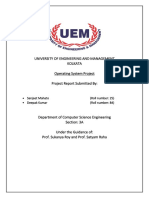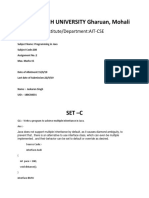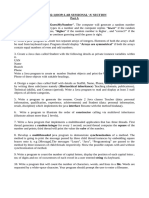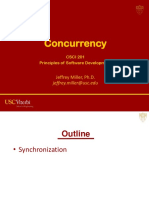0% found this document useful (0 votes)
30 views2 pagesJava 4thworksheet
The document describes a Java program that uses two threads - one to print even numbers and the other to print odd numbers up to 50. The program uses the synchronized keyword with methods to restrict access to the critical sections of code that print the numbers, allowing only one thread at a time to execute those sections. This prevents race conditions and concurrent access issues. The learning outcomes cover gaining knowledge about using synchronization, understanding race conditions and shared resources, and handling exceptions in multithreaded programs.
Uploaded by
Hrishabh GuptaCopyright
© © All Rights Reserved
We take content rights seriously. If you suspect this is your content, claim it here.
Available Formats
Download as PDF, TXT or read online on Scribd
0% found this document useful (0 votes)
30 views2 pagesJava 4thworksheet
The document describes a Java program that uses two threads - one to print even numbers and the other to print odd numbers up to 50. The program uses the synchronized keyword with methods to restrict access to the critical sections of code that print the numbers, allowing only one thread at a time to execute those sections. This prevents race conditions and concurrent access issues. The learning outcomes cover gaining knowledge about using synchronization, understanding race conditions and shared resources, and handling exceptions in multithreaded programs.
Uploaded by
Hrishabh GuptaCopyright
© © All Rights Reserved
We take content rights seriously. If you suspect this is your content, claim it here.
Available Formats
Download as PDF, TXT or read online on Scribd
/ 2
























































